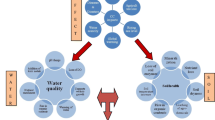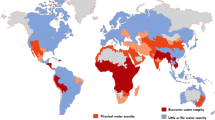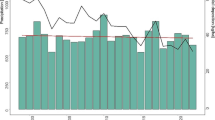Abstract
Water is becoming an increasingly scarce resource due to growing multi-sector demand and the effects of climate change. During droughts, the proportional rule is the most widespread water allocation method applied in irrigation systems. However, this method fails to guarantee efficient water allocation or to provide a fair method of water allocation. This paper aims to verify whether by replacing the water allocation methods based on a proportional rule with methods based on a priority rule could improve the allocation of water resources and minimize the negative economic impacts of water shortages. The ultimate objective of this research is to design a water pricing scheme capable of guaranteeing efficient water reallocation during drought conditions. Therefore, an experiment was carried out for the largest irrigated area in southern Italy, covered by the Capitanata Reclamation and Irrigation board (CBC). A positive mathematical programming model was implemented in order to simulate the effects of the proposed mechanism. The findings show that priority mechanisms have the potential to improve overall economic efficiency in the event of water shortages. However, results also point to the need for optimal design of a differentiated water pricing scheme.







Similar content being viewed by others
Data availability
The dataset generating during and/or analyzed are available from the corresponding author on reasonable request.
References
Alarcón J, Garrido A, Juana L (2014) Managing irrigation water shortage: a comparison between five allocation rules based on crop benefit functions. Water Resour Manag 28:2315–2329. https://doi.org/10.1007/s11269-014-0617-z
Albiac J, Calvo E, Kahil T, Esteban E (2020) The challenge of irrigation water pricing in the Water Framework Directive. Water Altern 13(3):674–690
Berbel J, Gómez-Limón JA (2000) The impact of water-pricing policy in Spain: an analysis of three irrigated areas. Agric Water Manag 43(2):219–238. https://doi.org/10.1016/S0378-3774(99)00056-6
Berbel J, Borrego-Marin M, Exposito A, Giannoccaro G, Montilla-Lopez NM, Roseta-Palma C (2019) Analysis of irrigation water tariffs and taxes in Europe. Water Policy 21:806–825
Berbel J, Expósito A (2020) The theory and practice of water pricing and cost recovery in the Water Framework Directive. Water Altern 13:659–673
Bierkens MF, Reinhard S, de Bruijn JA, Veninga W, Wada Y (2019) The shadow price of irrigation water in major groundwater-depleting countries. Water Resour Res 55:4266–4287. https://doi.org/10.1029/2018WR023086
Calatrava J, Garrido A (2005) Spot water markets and risk in water supply. Agric Econ 33:131–143. https://doi.org/10.1111/j.1574-0864.2005.00402.x
Chatterjee B, Howitt RE, Sexton RJ (1998) The optimal joint provision of water for irrigation and hydropower. J Environ Econ 36(3):295–313. https://doi.org/10.1006/jeem.1998.1047
Cortignani R, Dell’Unto D, Dono G (2018) Recovering the costs of irrigation water with different pricing methods: insights from a Mediterranean case study. Agric Water Manag 199:148–156. https://doi.org/10.1016/j.agwat.2017.12.016
Dono G, Giraldo L, Severini S (2010) Pricing of irrigation water under alternative charging methods: possible shortcomings of a volumetric approach. Agric Water Manag 97:1795–1805. https://doi.org/10.1016/j.agwat.2010.06.013
Dono G, Giraldo L (2012) Irrigation water: alternative pricing schemes under uncertain climatic conditions. In: Kumar M (ed) Problems, perspectives and challenges of agricultural water management, Norderstedt, Germany
Expósito A, Berbel J (2017) Why is water pricing ineffective for deficit irrigation schemes? A case study in southern Spain. Water Resour Manag 31:1047–1059. https://doi.org/10.1007/s11269-016-1563-8
Freebairn J, Quiggin J (2006) Water rights for variable supplies. Aust J Agric Resour 50:295–312. https://doi.org/10.1111/j.1467-8489.2006.00341.x
Garrick D, Whitten SM, Coggan A (2013) Understanding the evolution and performance of water markets and allocation policy: a transaction costs analysis framework. Ecol Econ 88:195–205. https://doi.org/10.1016/j.ecolecon.2012.12.010
Giannoccaro G, Pedraza V, Berbel J (2013) Analysis of stakeholders’ attitudes towards. Water Mark South Spain Water 5(4):1517–1532. https://doi.org/10.3390/w5041517
Giannoccaro G, Casieri A, de Vito R, Zingaro D, Portoghese I (2019) Impatti economici dell’interruzione del servizio irriguo consortile nell’area della Capitanata (Puglia). Stima empirica per il pomodoro da industria nel periodo 2001-2016. Aestimum 101–114. https://doi.org/10.13128/aestim-7382
Giannoccaro G, Prosperi M, Zanni G (2010) Assessing the impact of alternative water pricing schemes on income distribution. J Agric Econ 61(3):27–544
Giraldo L, Cortignani R, Dono G (2014) Simulating volumetric pricing for irrigation water operational cost recovery under complete and perfect information. Water 6:1204–1220. https://doi.org/10.3390/w6051204
Gómez-Limón JA, Gutiérrez-Martín C, Montilla-López NM (2021) Priority water rights. Are they useful for improving water-use efficiency at the irrigation district level? Agric Water Manag 257:107145. https://doi.org/10.1016/j.agwat.2021.107145
Gómez-Limón JA, Gutiérrez-Martín C, Montilla-López NM (2020) Agricultural water allocation under cyclical scarcity: the role of priority water rights. Water 12:1835
Gomez-Limon JA, Riesgo L (2004) Irrigation water pricing: differential impacts on irrigated farms. Agric Econ 31:47–66. https://doi.org/10.1111/j.1574-0862.2004.tb00221.x
Gutiérrez-Martín C, Gómez-Limón JA, Montilla-López NM (2022) Priority water rights for irrigation at the river basin level. Do they improve economic efficiency during drought periods? Water Resour Manag 36:3737–3758. https://doi.org/10.1007/s11269-022-03228-8
Hazel P, Norton RD (1986) Mathematical programming for economic analysis in agriculture. MacMillan, New York
Heckelei T, Britz W (2005) Models based on positive mathematical programming: state of the art and further extentions. In: Arfini F (Ed.) Modelling Agricultural Policies: State of the Arte, New, Challenges. Monte Universita Parma, Parma, pp. 48–74
Heckelei T, Britz W, Zhang Y (2012) Positive mathematical programming approaches–recent developments in literature and applied modelling. Bio Based Appl Econ J 1(1):109–124. https://doi.org/10.22004/ag.econ.125722
Howitt RE (1995) Positive mathematical programming. Am J Agric Econ 77:329–342
IPCC (2023) Climate change 2023: synthesis report. A Report of the Intergovernmental Panel on Climate Change. Contribution of Working Groups I II and III to the Sixth Assessment Report of the Intergovernmental Panel on Climate Change [Core Writing Team H. Lee and J. Romero (eds)]. IPCC, Geneva Switzerland
Johnson TP (2005) Snowball sampling. Encyclopedia of biostatistics, 7. https://doi.org/10.1002/0470011815.b2a16070
Laskookalayeh SS, Najafabadi MM, Shahnazari A (2022) Investigating the effects of management of irrigation water distribution on farmers’ gross profit under uncertainty: a new positive mathematical programming model. J Clean Prod 351:131277
Lefebvre M, Gangadharan L, Thoyer S (2012) Do security-differentiated water rights improve the performance of water markets? Am J Agric Econ 94:1113–1135
Martínez-Dalmau J, Gutiérrez-Martín C, Expósito A, Berbel J (2023) Analysis of water pricing policy effects in a Mediterranean basin through a hydroeconomic model. Water Res Manag 37:1599–1618. https://doi.org/10.1007/s11269-023-03446-8
Maskey ML, Dogan MS, Fernandez-Bou AS, Li L, Guzman A, Arnold W, Goharian E, Lund JR, Medellin-Azuara J (2022) Managing aquifer recharge to overcome overdraft in the lower American River California USA. Water 14:966. https://doi.org/10.3390/w14060966
Medellín-Azuara J, Howitt RE, Harou JJ (2012) Predicting farmer responses to water pricing, rationing and subsidies assuming profit maximizing investment in irrigation technology. Agric Water Manag 108:73–82. https://doi.org/10.1016/j.agwat.2011.12.017
Mirra L, de Gennaro BC, Giannoccaro G (2021) Farmer evaluation of irrigation services. Collective or self-supplied? Land 10:415. https://doi.org/10.3390/land10040415
Molle F, Sanchis-Ibor C (2019) Irrigation policies in the Mediterranean: trends and challenges. Irrigation in the Mediterranean: Technologies, Institutions and Policies, Spinger, Cham, Switzerland 279–313
Moghaddasi R, Bakhshi A (2016) Application of positive mathematical programming for water allocation in agriculture (Case study: agronomy subsector in Sarakhs plain). J Dev Agric Econ 23(4):115–139. https://doi.org/10.30490/AEAD.2016.59015
Ozano K, Roby A, MacDonald A, Upton K, Hepworth N, Gorman C, Matthews J, Dominique K, Trabacchi C, Chijiutomi C, Tshabalala Z, Joshi D, Udalagama U, Nicol A, Gcrf WSH (2022) Groundwater: making the invisible visible - K4D briefing pack. Institute of Development Studies (IDS). https://doi.org/10.19088/K4D.2022.027
Pérez-Blanco CD, Essenfelder AH, Gutiérrez-Martín C (2020) A tale of two rivers: Integrated hydro-economic modeling for the evaluation of trading opportunities and return flow externalities in inter-basin agricultural water markets. J Hydrol 584:124676. https://doi.org/10.1016/j.jhydrol.2020.124676
Portoghese I, Giannoccaro G, Giordano R, Pagano A (2021) Modeling the impacts of volumetric water pricing in irrigation districts with conjunctive use of surface and groundwater resources. Agric Water Manag 244:106561
Pronti A, Berbel J (2023) The impact of volumetric water tariffs in irrigated agriculture in Northern Italy. Environ Impact Assess Rev 98:106922. https://doi.org/10.1016/j.eiar.2022.106922
Pulido-Velázquez M, Andreu J, Sahuquillo A (2006) Economic optimization of conjunctive use of surface water and groundwater at the basin scale. J Water Resour Plan Manag 132(6):454–467. https://doi.org/10.1061/(ASCE)0733-9496(2006)132:6(454)
Pulido-Velazquez M, Marques GF, Harou JJ, Lund JR (2016) Hydroeconomic models as decision support tools for conjunctive management of surface and groundwater. Integr Environ Assess Manag 27:693–710
Sabale R, Venkatesh B, Jose M (2023) Sustainable water resource management through conjunctive use of groundwater and surface water: A review. Innov Infrastruct Solut 8(1):17. https://doi.org/10.1007/s41062-022-00992-9
Sapino F, Pérez-Blanco CD, Gutiérrez-Martín C, Frontuto V (2020) An ensemble experiment of mathematical programming models to assess socio-economic effects of agricultural water pricing reform in the Piedmont Region Italy. J Environ Manag 267:110645. https://doi.org/10.1016/j.jenvman.2020.110645
Sidhu BS, Kandlikar M, Ramankutty N (2020) Power tariffs for groundwater irrigation in India: a comparative analysis of the environmental, equity, and economic tradeoffs. World Dev 128:104836. https://doi.org/10.1016/j.worlddev.2019.104836
Viaggi D, Raggi M, Bartolini F, Gallerani V (2010) Designing contracts for irrigation water under asymmetric information: are simple pricing mechanisms enough? Agric Water Manag 97:1326–1332. https://doi.org/10.1016/j.agwat.2010.03.01
Xiao-jun W, Jian-yun Z, Elmahdi A, Shahid S, Juan G (2023) A water resources assessment framework for management strategies of large coal-power bases development in China. Mitig Adapt 28(6):35. https://doi.org/10.1007/s11027-011-9352-4
Wang L, Fang L, Hipel KW (2007) Mathematical programming approaches for modeling water rights allocation. Water Resour Plan Manag 133(1):50–59. 10.1061/(ASCE)0733-9496(2007)133:1(50)
Zolfagharipoor MA, Ahmadi A, Nikouei A (2022) Market-based groundwater resources allocation mechanism: an inter-sectoral water exchanges programming analysis. Wat Resour Econ 37:100193. https://doi.org/10.1016/j.wre.2022.100193
Acknowledgements
This work was the result of an inclusive international collaboration among University of Naples (Italy), Bari (Italy) and Cordoba (Spain). We would like to thank professor Guido D’Urso from University of Naples Federico II for allowing the precious networking.
Author Contributions
LM: Conceptualization, Methodology, Visualization, Writing – original draft, Writing – review & editing. CG-M: Investigation, Methodology, Data Management, review. GG: Conceptualization, Visualization, Data Collection, Supervision, review.
Funding
Survey of farmers was carried out within the project “Economia delle risorse irrigue in Puglia”, CUPB37G17000030007, funded by the Regional Government of Apulia.
Author information
Authors and Affiliations
Corresponding authors
Ethics declarations
Conflict of Interest
The authors declare no competing interests.
Consent to Participate
The authors declare that they are aware and consent to their participation in this paper.
Consent for Publish
The authors declare that they consent to the publication of this paper.
Additional information
Publisher’s note Springer Nature remains neutral with regard to jurisdictional claims in published maps and institutional affiliations.
Rights and permissions
Springer Nature or its licensor (e.g. a society or other partner) holds exclusive rights to this article under a publishing agreement with the author(s) or other rightsholder(s); author self-archiving of the accepted manuscript version of this article is solely governed by the terms of such publishing agreement and applicable law.
About this article
Cite this article
Mirra, L., Gutiérrez-Martín, C. & Giannoccaro, G. Security-differentiated Water Pricing as a Mechanism for Mitigating Drought Impacts. Insights from a Case Study in the Mediterranean Basin. Environmental Management 73, 683–696 (2024). https://doi.org/10.1007/s00267-023-01886-x
Received:
Accepted:
Published:
Issue Date:
DOI: https://doi.org/10.1007/s00267-023-01886-x




